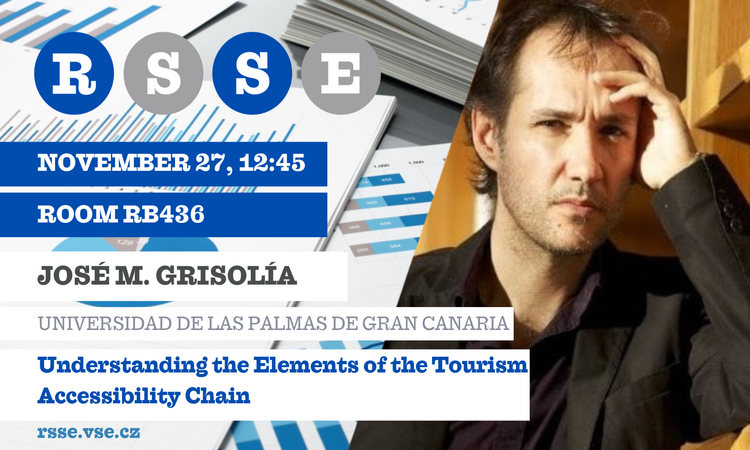RSSE: José M. Grisolía (Universidad de Las Palmas de Gran Canaria) Understanding the Elements of the Tourism Accessibility Chain
| Začátek: | čtvrtek 27. listopadu 2025, 12:45 |
|---|---|
| Konec: | čtvrtek 27. listopadu 2025, 14:15 |
| Jazyk události: | angličtina |
| Místo konání: | RB 436 |
| Online událost: | Microsoft Teams |
| Kontaktní osoba: | Lubomír Cingl |
| Tagy: | #doktorandi #phd #phdstudents #research #rsse #seminars #zamestnanci |
It is our pleasure that José M. Grisolía (Universidad de Las Palmas de Gran Canaria) will present on Thursday, November 27, 2025, at 12:45 in room RB436 about the topic “Understanding the Elements of the Tourism Accessibility Chain”.
Registration is not required and anyone who would like to attend is warmly invited.
It is also possible to participate online via MS Teams at this link. In case of any connection issues, please contact lubomir.cingl@vse.cz.
ABSTRACT: This study investigates how different components of the accessibility chain influence tourist destination choices, using a Hybrid Discrete Choice (HDC) model that integrates stated preferences and latent attitudinal constructs. Drawing on a sample of visitors to Gran Canaria, the results show that staff preparedness, accessible environments, and reliable information significantly affect destination choice, with staff training emerging as the most influential factor. The research is grounded in the Social Model of Disability, which views disability as a social construct, and the Capability Approach, which focuses on individuals' freedom to live the lives they value. These frameworks reframe accessibility not as an isolated technical issue but as a systemic condition enabling or constraining effective participation. The study also adopts a Universal and Inclusive Design perspective within this framework, recognising human diversity as a central design parameter in tourism systems. The estimated model reveals substantial heterogeneity in preferences: individuals with direct or indirect experience of disability place greater importance on staff support and trustworthy information. At the same time, younger and non-disabled tourists prioritise price and location. By combining behavioural and attitudinal data, the study demonstrates the added value of HDC models for understanding how accessibility is cognitively evaluated and behaviourally enacted. The findings have practical implications for inclusive destination design. Rather than addressing accessibility through isolated improvements, tourism systems should adopt a chain-based approach, ensuring coherence across all stages of the travel experience. As societies age and accessibility becomes a strategic imperative, this model provides a transferable tool for evaluating service gaps and guiding inclusive policy design.
BIO: José M. Grisolía is Associate Professor of Economics at Universidad de Las Palmas de Gran Canaria (Spain). Before returning to Spain, he held academic positions at the University of Nottingham Ningbo China, Xi’an Jiaotong–Liverpool University, Queen’s University Belfast, University of Newcastle and the University of London. He holds a PhD in Applied Economics and an MA in Transport Economics from the University of Leeds (UK). His research focuses on individuals’ decision-making in fields such as food, health, environment, transport, and culture, using Stated Preference and Discrete Choice Modelling methods. He has authored more than 20 peer-reviewed articles in leading international journals including Food Quality and Preference, Tourism Management, Transportation Research Part A, Social Science & Medicine, and Journal of Cultural Economics. He has extensive teaching experience across Europe and Asia and has participated in several international research projects.
